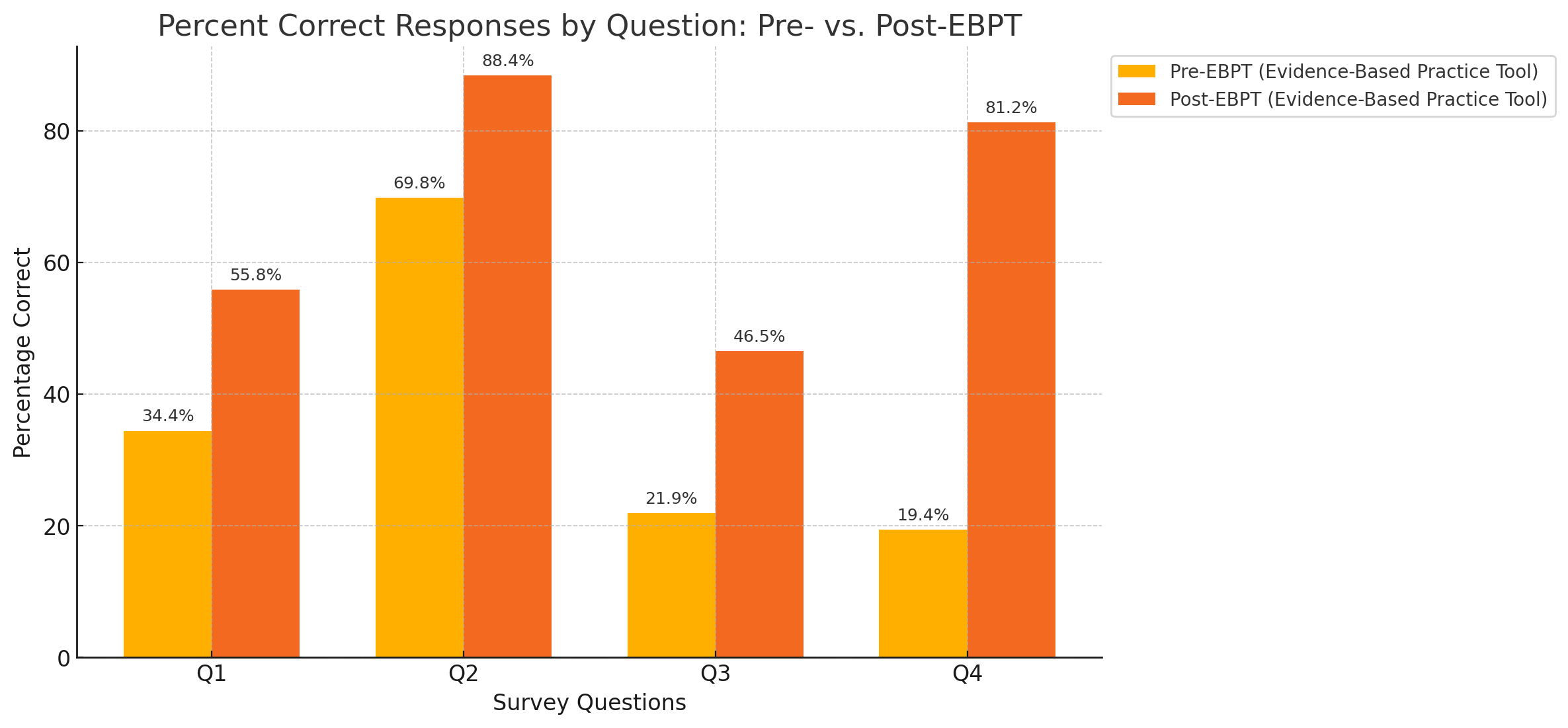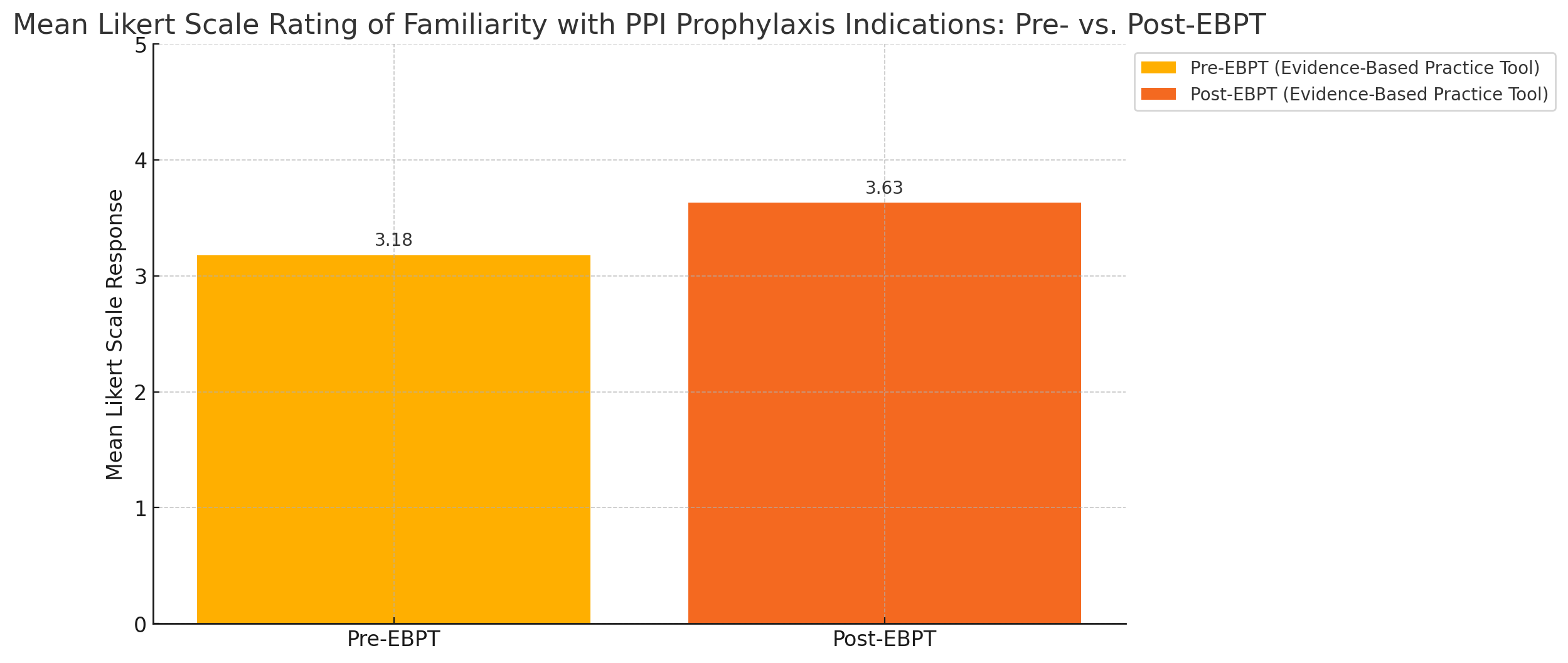Tuesday Poster Session
Category: GI Bleeding
P5193 - Enhanced Trainee Understanding of Appropriate Stress Ulcer Prophylaxis Using an Evidence-Based Practice Tool
Tuesday, October 28, 2025
10:30 AM - 4:00 PM PDT
Location: Exhibit Hall

Alexandria Markley, MD
Mount Sinai West, Icahn School of Medicine at Mount Sinai
New York, NY
Presenting Author(s)
Alexandria Markley, MD1, Astitva Soni, MD2, Luis Rendon Rodriguez, MD1, Saro Aprikan, MBBCh3, Alexander Davidovich, DO4, Michael S.. Smith, MD, MBA5
1Mount Sinai West, Icahn School of Medicine at Mount Sinai, New York, NY; 2Mount Sinai West, New York, NY; 3Mount Sinai Morningside, Icahn School of Medicine at Mount Sinai, New York, NY; 4Mount Sinai Morningside, New York, NY; 5Icahn School of Medicine at Mount Sinai, New York, NY
Introduction: Proton pump inhibitors (PPIs) are commonly prescribed for stress ulcer prophylaxis (SUP) in critically ill patients. Inappropriate initiation of inpatient PPI therapy can contribute to unnecessary polypharmacy and increases the potential risk of complications, including pneumonia and C. difficile infection. This study evaluates the impact of a targeted evidence-based practice tool (EBPT) educational intervention on knowledge and appropriate usage of PPIs for SUP among residents rotating through a medical intensive care unit (ICU).
Methods: A prospective cohort study was performed, including internal medicine residents rotating through the ICU of a large urban medical center. A simple yet comprehensive EBPT summarizing the key indications for SUP in ICU patients was distributed to all trainees. An internally validated survey assessing baseline medical knowledge, confidence, and practice-based understanding of the appropriate indications of SUP was circulated to participants before and after the EBPT, with the post-intervention questionnaire being completed two weeks after the intervention. Survey responses were analyzed to assess changes in understanding of and reported clinical behavior for SUP.
Results: A total of 43 residents completed the study (24 first-years, 6 second-years, 13 third-years). Majority had at least four weeks experience rotating in an ICU during residency, with many having 12 weeks or more prior to completing the study. From the first to the second survey, self-reported familiarity with indications for SUP initiation improved from a mean 5-point Likert scale score of 3.18 to 3.63 (p=.008). Participants answered four knowledge-based questions assessing appropriate PPI use in SUP, including two clinical vignettes, one multiple-choice, and one multi-select question. Knowledge assessment showed marked improvement between surveys: correct responses increased from 34% to 56% (Q1) (p=.02), 70% to 88% (Q2) (p=.02), and 22% to 47% (Q3) (p=.003). For the multi-select question, correct selections increased from 19% to 81% (P=< .0001), indicating improved accuracy in identifying appropriate SUP indications following use of the EBPT.
Discussion: Following EBPT-based education, residents demonstrated an increased understanding of the indications for initiation PPI use for SUP in ICU patients as well as greater confidence in their knowledge of SUP protocols. These findings demonstrate the benefit of utilizing a targeted EBPT to promote appropriate SUP management in the ICU setting.

Figure: Figure 1. Percent correct responses to knowledge-based questions before and after implementation of an Evidence-Based Practice Tool (EBPT).

Figure: Figure 2. Mean self-reported familiarity with PPI prophylaxis indications on a 5-point Likert scale before and after implementation of an Evidence-Based Practice Tool
Disclosures:
Alexandria Markley indicated no relevant financial relationships.
Astitva Soni indicated no relevant financial relationships.
Luis Rendon Rodriguez indicated no relevant financial relationships.
Saro Aprikan indicated no relevant financial relationships.
Alexander Davidovich indicated no relevant financial relationships.
Michael Smith: Castle Biosciences – Consultant. CDx Diagnostics – Consultant. Lucid Diagnostics – Consultant. Provation Software – Consultant. Sanofi – Consultant. Steris Endoscopy – Consultant.
Alexandria Markley, MD1, Astitva Soni, MD2, Luis Rendon Rodriguez, MD1, Saro Aprikan, MBBCh3, Alexander Davidovich, DO4, Michael S.. Smith, MD, MBA5. P5193 - Enhanced Trainee Understanding of Appropriate Stress Ulcer Prophylaxis Using an Evidence-Based Practice Tool, ACG 2025 Annual Scientific Meeting Abstracts. Phoenix, AZ: American College of Gastroenterology.
1Mount Sinai West, Icahn School of Medicine at Mount Sinai, New York, NY; 2Mount Sinai West, New York, NY; 3Mount Sinai Morningside, Icahn School of Medicine at Mount Sinai, New York, NY; 4Mount Sinai Morningside, New York, NY; 5Icahn School of Medicine at Mount Sinai, New York, NY
Introduction: Proton pump inhibitors (PPIs) are commonly prescribed for stress ulcer prophylaxis (SUP) in critically ill patients. Inappropriate initiation of inpatient PPI therapy can contribute to unnecessary polypharmacy and increases the potential risk of complications, including pneumonia and C. difficile infection. This study evaluates the impact of a targeted evidence-based practice tool (EBPT) educational intervention on knowledge and appropriate usage of PPIs for SUP among residents rotating through a medical intensive care unit (ICU).
Methods: A prospective cohort study was performed, including internal medicine residents rotating through the ICU of a large urban medical center. A simple yet comprehensive EBPT summarizing the key indications for SUP in ICU patients was distributed to all trainees. An internally validated survey assessing baseline medical knowledge, confidence, and practice-based understanding of the appropriate indications of SUP was circulated to participants before and after the EBPT, with the post-intervention questionnaire being completed two weeks after the intervention. Survey responses were analyzed to assess changes in understanding of and reported clinical behavior for SUP.
Results: A total of 43 residents completed the study (24 first-years, 6 second-years, 13 third-years). Majority had at least four weeks experience rotating in an ICU during residency, with many having 12 weeks or more prior to completing the study. From the first to the second survey, self-reported familiarity with indications for SUP initiation improved from a mean 5-point Likert scale score of 3.18 to 3.63 (p=.008). Participants answered four knowledge-based questions assessing appropriate PPI use in SUP, including two clinical vignettes, one multiple-choice, and one multi-select question. Knowledge assessment showed marked improvement between surveys: correct responses increased from 34% to 56% (Q1) (p=.02), 70% to 88% (Q2) (p=.02), and 22% to 47% (Q3) (p=.003). For the multi-select question, correct selections increased from 19% to 81% (P=< .0001), indicating improved accuracy in identifying appropriate SUP indications following use of the EBPT.
Discussion: Following EBPT-based education, residents demonstrated an increased understanding of the indications for initiation PPI use for SUP in ICU patients as well as greater confidence in their knowledge of SUP protocols. These findings demonstrate the benefit of utilizing a targeted EBPT to promote appropriate SUP management in the ICU setting.

Figure: Figure 1. Percent correct responses to knowledge-based questions before and after implementation of an Evidence-Based Practice Tool (EBPT).

Figure: Figure 2. Mean self-reported familiarity with PPI prophylaxis indications on a 5-point Likert scale before and after implementation of an Evidence-Based Practice Tool
Disclosures:
Alexandria Markley indicated no relevant financial relationships.
Astitva Soni indicated no relevant financial relationships.
Luis Rendon Rodriguez indicated no relevant financial relationships.
Saro Aprikan indicated no relevant financial relationships.
Alexander Davidovich indicated no relevant financial relationships.
Michael Smith: Castle Biosciences – Consultant. CDx Diagnostics – Consultant. Lucid Diagnostics – Consultant. Provation Software – Consultant. Sanofi – Consultant. Steris Endoscopy – Consultant.
Alexandria Markley, MD1, Astitva Soni, MD2, Luis Rendon Rodriguez, MD1, Saro Aprikan, MBBCh3, Alexander Davidovich, DO4, Michael S.. Smith, MD, MBA5. P5193 - Enhanced Trainee Understanding of Appropriate Stress Ulcer Prophylaxis Using an Evidence-Based Practice Tool, ACG 2025 Annual Scientific Meeting Abstracts. Phoenix, AZ: American College of Gastroenterology.
